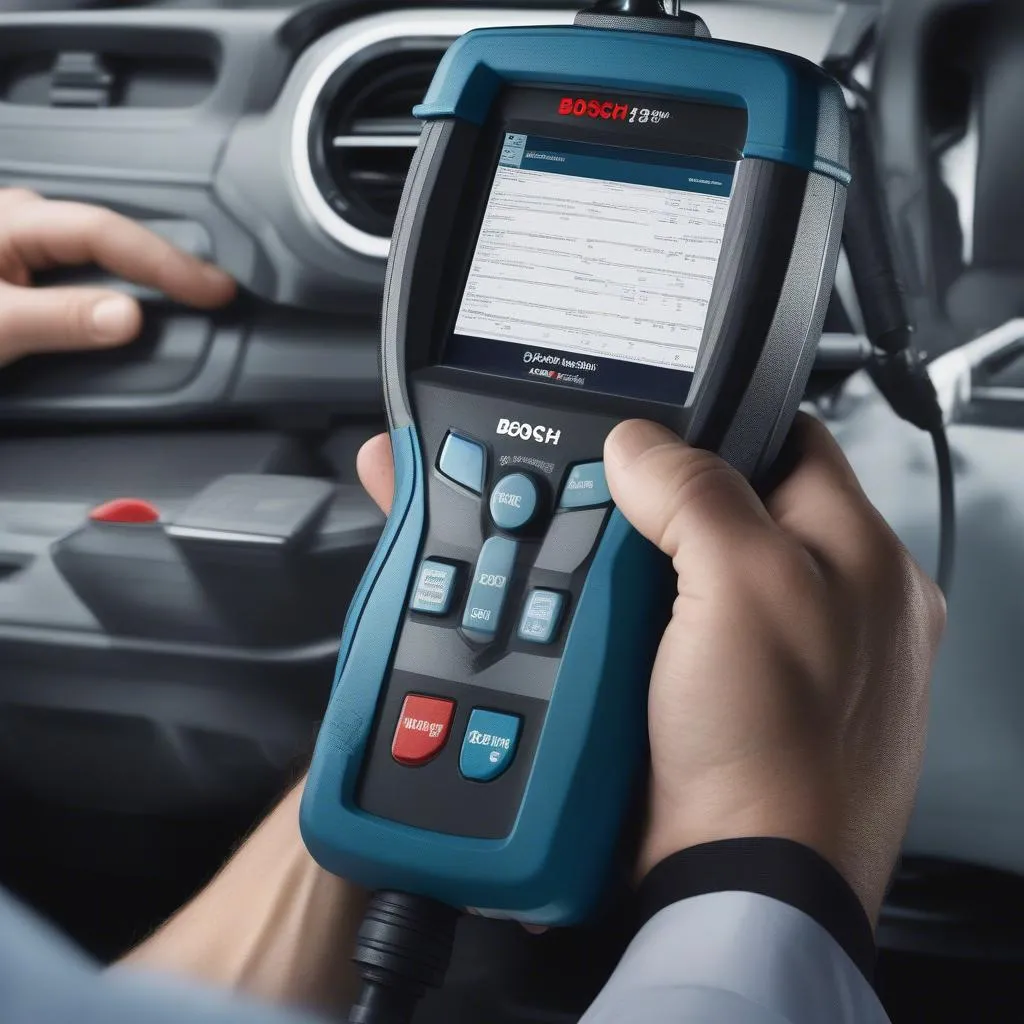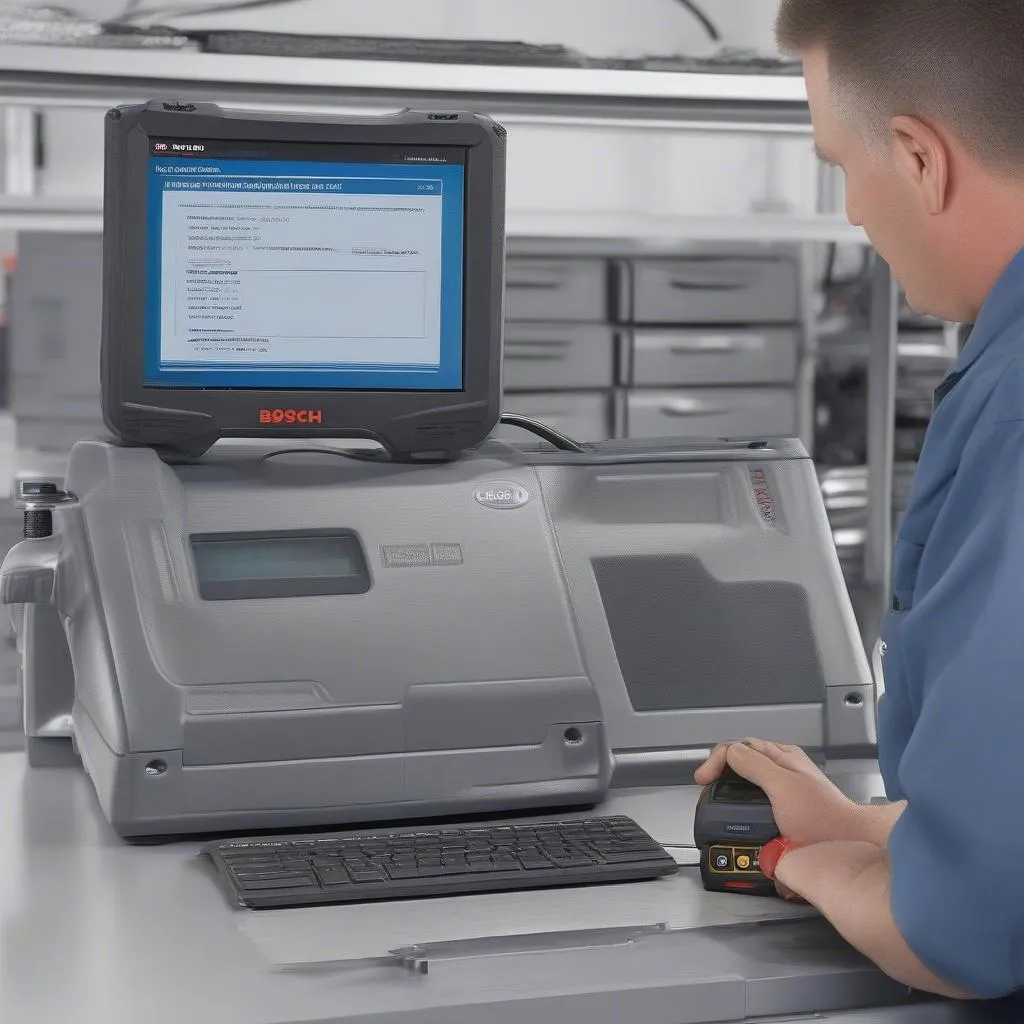Imagine this: you’re driving down a sunny California highway, enjoying the open road with your family, when suddenly your car starts sputtering. You pull over, check under the hood, and find nothing visibly wrong. You’re stumped. What could it be?
This, unfortunately, is a familiar story for many car owners. A misfire can be a frustrating and unpredictable issue, leaving you stranded on the side of the road or wondering what’s wrong with your car.
Thankfully, tools like the Bosch 1350 scan tool exist to help diagnose and solve these issues. But what exactly is the “Misfire Counter” on the Bosch 1350, and what does it tell us?
Understanding the Bosch 1350 Scan Tool Misfire Counter
What is a Misfire Counter?
The Misfire Counter on the Bosch 1350 scan tool is a diagnostic feature designed to track the number of times a cylinder in your engine fails to ignite properly. A misfire occurs when the air-fuel mixture in the cylinder doesn’t explode as it should, resulting in a loss of power and potential damage to your engine.
Importance of the Misfire Counter
Understanding the Misfire Counter is vital for both mechanics and car owners. For mechanics, it provides valuable insights into the health of your engine and helps pinpoint the root cause of misfires. For car owners, it’s an early warning system, helping you identify potential issues before they escalate into major problems.
How the Misfire Counter Works
When a cylinder misfires, your car’s engine control unit (ECU) detects this anomaly. The ECU records the misfire and increments the Misfire Counter for that specific cylinder. By reading the counter, you can see how many misfires have occurred and in which cylinders.
Deciphering the Misfire Counter Readings
Interpreting the Data
The Misfire Counter typically displays the number of misfires per cylinder. A higher number indicates a more frequent issue, suggesting a potential problem requiring attention.
What Does a High Misfire Counter Mean?
A high misfire counter can indicate a range of potential problems, including:
- Spark plug issues: Worn or faulty spark plugs are a common cause of misfires.
- Ignition coil problems: Damaged or malfunctioning ignition coils can also prevent spark plugs from firing correctly.
- Fuel delivery problems: Issues with fuel injectors, fuel pressure, or fuel quality can lead to misfires.
- Air intake problems: Restricted air intake or leaks in the intake manifold can disrupt the air-fuel mixture.
- Engine sensor malfunctions: Faulty sensors like the oxygen sensor, mass airflow sensor, or crankshaft position sensor can disrupt engine timing.
How to Use the Bosch 1350 Scan Tool
The Bosch 1350 scan tool is user-friendly, even for those without extensive mechanical experience. Here’s a step-by-step guide on how to use it to access the Misfire Counter:
- Connect the scan tool to your vehicle’s diagnostic port. This port is typically located under the dashboard, near the steering column.
- Turn the ignition key to the “ON” position.
- Follow the on-screen instructions to navigate to the “Misfire Counter” data.
- Read the misfire counts for each cylinder.
Common Questions About Bosch 1350 Scan Tool Misfire Counter
“Is a high misfire counter always a serious issue?”
Not necessarily. While a high misfire counter can be a sign of trouble, sometimes it can be caused by a minor issue like a loose spark plug wire. However, it’s always best to address the issue promptly to prevent further damage.
“Can I reset the Misfire Counter?”
Yes, most scan tools allow you to reset the Misfire Counter after addressing the underlying issue. Resetting the counter will clear the accumulated data and start fresh.
“What are the possible consequences of ignoring a high misfire counter?”
Ignoring a high misfire counter can lead to more serious problems, including:
- Reduced engine performance: Misfires can cause your car to lose power, making it difficult to accelerate or climb hills.
- Increased fuel consumption: Misfires can make your engine less efficient, resulting in higher fuel consumption.
- Engine damage: Prolonged misfires can cause damage to engine components like spark plugs, ignition coils, or even the catalytic converter.
Tips for Preventing Misfires
While misfires can be a frustrating issue, you can take steps to prevent them:
- Regular maintenance: Regularly servicing your car, including spark plug changes, is essential for keeping your engine running smoothly.
- High-quality fuel: Use high-quality gasoline and avoid using low-grade fuel, which can contribute to misfires.
- Regularly check for leaks: Ensure your intake manifold and fuel lines are leak-free to prevent air or fuel leaks.
- Replace worn parts: Replace worn or damaged engine components, such as spark plugs, ignition coils, or fuel injectors promptly.
Conclusion
The Bosch 1350 scan tool’s Misfire Counter is an invaluable tool for diagnosing and preventing misfire issues. By understanding how to interpret the readings and addressing any underlying problems, you can keep your car running smoothly and avoid costly repairs.
Have any other questions about your car’s diagnostics? We’re here to help! Contact us via Whatsapp at +84767531508 and let our expert team help you resolve any issues.
Don’t let a misfire keep you on the side of the road. Take control of your car’s health today!
 Bosch 1350 Scan Tool
Bosch 1350 Scan Tool
 Misfire Counter Reading
Misfire Counter Reading
 Spark Plug Maintenance
Spark Plug Maintenance


